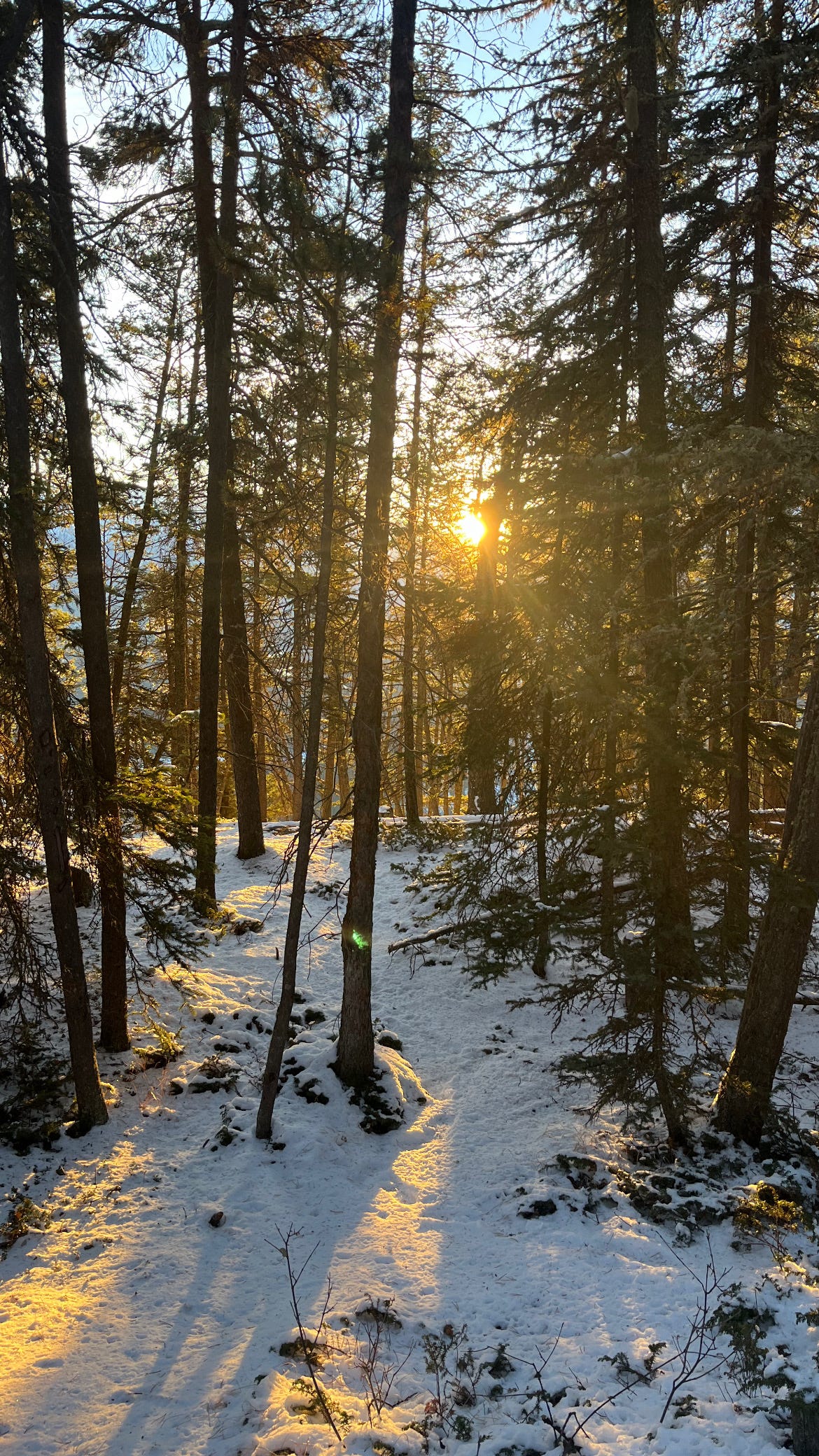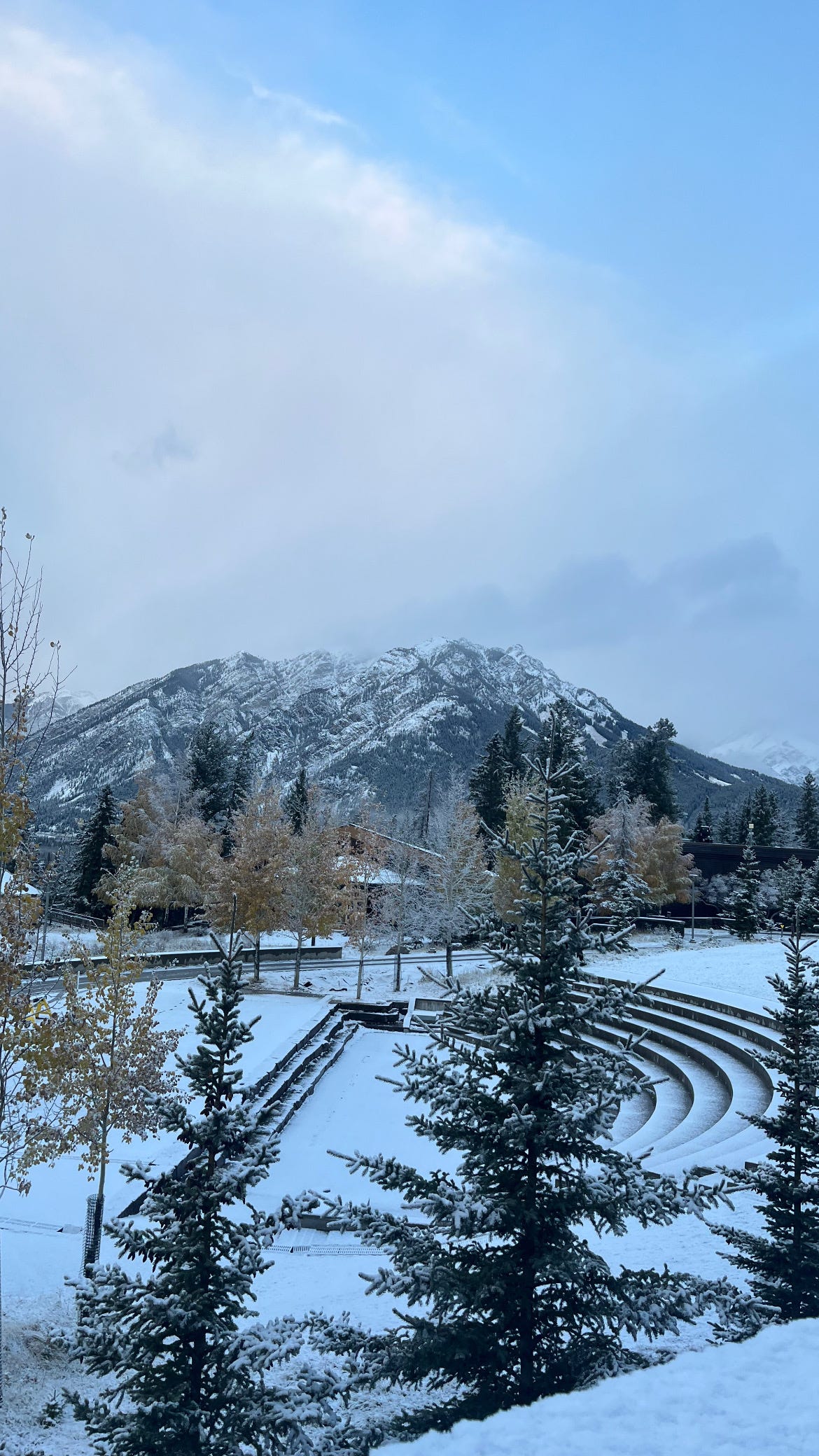Apologies for the temporary silence here on A Time and a Place. As ever, my reasons are time and place bound: I’ve been travelling to Canada where I’m now ensconced in a different time zone (mountain time, which always sounds inherently exciting!) and a residency at the wonderful Banff Centre, mentoring writers on the Mountain Intensive programme. It is a privilege to work with so many talented artists in such a rich and nurturing environment and a strange feeling to be so unmoored from life in the UK.
It is also unsettling and wonderful to negotiate the presence of snow. After a few days of blue-sky-cool, flakes started falling yesterday morning and today I woke up feeling as if I was inside one of the snow globes they sell to tourists like me downtown.
There are many poems about snow that enchant me and the ones I love best seem to ‘work’ (‘working’ being a subjective state, of course) because they capture the sense of singularity we get from it. In Richard Wilbur’s ‘First Snow in Alsace’, he opens with one of the most memorable first stanzas I’ve ever encountered:
The snow came down last night like moths
Burned on the moon; it fell till dawn,
Covered the town with simple cloths.
‘Moths / burned on the moon’. I never tire of that image, sinister and beautiful and hopeful all at once. When the snowflakes landed on my cheeks this morning, I was thinking of the papery bodies of moths, their extravagant quest for light. I like how the ‘simple cloths’ contrast with the intricacy and surprise of the moth image too. Wilbur’s poem tries to evoke the naivety snow draws from us. Snow is ‘benign’ on the windows of children, but the context for Wilbur’s piece is a war-ravaged landscape:
Absolute snow lies rumpled on
What shellbursts scattered and deranged,
Entangled railings, crevassed lawn.
As if it did not know they'd changed,
Snow smoothly clasps the roofs of homes
Fear-gutted, trustless and estranged.
There is something incredibly poignant about the way snow touches everything, blankets all ‘as if it did not know’. There’s a lot going on in that line - of course, the snow DOESN’T know. But by imbuing it with the possibility of wisdom and prescience and regret, Wilbur highlights all that we project on weather, how we make landscape and condition responsible for our human states of mind and states of heart. In a way that reminds me of Joyce’s ‘The Dead’ (and, as an aside David Peace’s brilliant new novel ‘Munichs’ which riffs on the closing images of that story, snow falling on the damaged and the lost), Wilbur imagines snow filling the eyes of ‘soldiers dead a little while’. But we end with a singular figure walking through this changed scene:
The night guard coming from his post,
Ten first-snows back in thought, walks slow
And warms him with a boyish boast:
He was the first to see the snow.
That last, isolated line lifts us and breaks us at the same time. We never quite shake that childish wonder, the joy of imprinting the fresh fall with our footsteps. I think the phrase ‘ten first-snows back in thought’ is a wonderful example of Wilbur’s concision and elegance. It shows us how snow blurs time, memories of snow form a seam through a life. The boyish boast is futile and inappropriate in context, but it is also inevitable and hopeful as the moths who burn themselves on the vast, distant lamp of the moon.
*
Pick any topic at random and there’s a good chance my favourite poem on that subject will have been written by Norman MacCaig. Herons. Dogs. Mountains. Movement. Snow. Here’s his piece Explicit Snow in its entirety:
First snow is never all the snows there were
Come back again, but novel in the sun
As though a newness had but just begun.
It does not fall as rain does from nowhere
Or from that cloud spinnakered on the blue,
But from a place we feel we could go to.
As a great actor steps, not from the wings,
But from the play's extension -- all he does
Is move to the seen from the mysterious --
And his performance is the first of all --
The snow falls from its implications and
Stages pure newness on the uncurtained land.
And the hill we've looked out of existence comes
Vivid in its own language; and this tree
Stands self-explained, its own soliloquy.
I never know where to begin with MacCaig. He makes me feel like a child in a sweet shop. It’s interesting to contrast the opening lines with Wilbur’s ‘ten first-snows back in thought’. MacCaig captures the way that the same visual effect (Wilbur’s ‘simple cloths’ draped over everything) always feels novel and exciting, how we never really tire of it.
If a stanza is a kind of room or dwelling place and if I had to make a home in one of those rooms forever, I’d choose the second verse of Explicit Snow:
It does not fall as rain does from nowhere
Or from that cloud spinnakered on the blue,
But from a place we feel we could go to.
MacCaig goes on to make this tangible with the deft impression of the actor who is so good he he seems to join the stage ‘from the play’s extension’, but its the line ‘a place we feel we could go to’ which really makes me ache. What is that place? We all feel it, all have our private versions of it. This morning in Banff for me that imagined place was Wyoming Brook in the Peak District, a downhill slope with my son as a baby, carried through the cold, close to my chest. It’s the past, but the past-as-touching-distance. But that’s too specific - it is not time-bound. I kept thinking about an article a friend sent me years ago about lifetimes and ‘queer time’ in which the author argues:
‘I’ve been thinking recently that queer time for me is a self-declared snow day. A chance to stay in bed and explore ourselves unhindered by the outside world. A chance to exist, to play — free from the hetero pillars of career, marriage, and lineage. A break from the ticking clock of larger society’s notions of progression.’
(For me, this also works as a great description of poetry. The full article is excellent.)
I love the way MacCaig suggests that snow is a kind of revealing as well as a cover: it’s there in that phrase ‘uncurtained land’. In the silence after a snowfall, we feel we’re having something presented to us. An opportunity we might squander, that we’re fated to squander, in fact.
The last stanza is classic MacCaig - frustrated with the limitations of the human gaze, the human imagination. He’s so right that we have a tendency to ‘look’ things out of existence. He’s always striving to conjure things in their own more-than-human language, even as he admits it’s a fundamentally flawed idea. I’ve only been in Banff a few days and I’ve probably looked The Cascades and the other mountains that preside over town out of existence. Perhaps the ‘trick’ is to perform the magic snow performs on us in our everyday ways-of-seeing, to try and get to the self-explained landscape, the ‘soliloquy’ of each tree and texture.
Happy snow days, folks.






